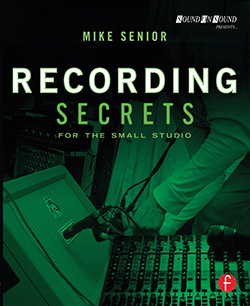Recording Secrets For The Small Studio - Additional Resources (1st Edition Archive)
Introduction
Welcome to the archived on-line resource pages for the first edition of Recording Secrets For The Small Studio. You can access updated resource pages for the current edition here. The resources are all free to use for educational purposes, and include:
Extensive Audio Examples: More than 300 audio demonstrations to illustrate important points in each chapter of the text. Files are available not only in 192kbps MP3 format for quick auditioning (with in-line play button), but also in 16-bit WAV format, allowing critical comparison of more subtle effects within your own DAW system.
'Recording Secrets' Library Of Mic Positions: A growing database of instrument recordings, extensively multimiked with identical microphones so as to provide an unrivalled insight into the art of microphone placement. Compare dozens of different mic positions and combinations around the same instrument quickly and easily, so you can fast-track your own productions and make the best use of limited studio time. So far the library features 450 audio files covering 20 instruments, including acoustic guitar, electric guitar, upright piano, grand piano, upright bass, kick drum, snare drum, cymbals, saxes, clarinets, and flute.
Free Backing-track Downloads For Overdubbing Practice: More than a dozen of the most popular projects in the 'Mixing Secrets' Free Multitrack Download Library specifically formatted for overdubbing practice – so you don’t have to produce whole projects from scratch until you feel ready to! Each download comprises 4-6 basic mix stems in 24-bit/44.1kHz WAV format for you to import into your DAW, whereupon you can either leave their track faders flat to create a respectable full backing mix, or rebalance/mute them to help with the process of adding your own new recorded parts. A cue sheet is also included in each case, indicating the musical structure, key, and tempo, and there’s a comp sheet too, complete with lyrics – so there’s no need to create any of that paperwork for yourself when you’d rather be moving mics around!
Affordable Hardware & Recommendations: Mike’s personal tips for affordable small-studio gear, complete with links to the appropriate manufacturers – check out the ‘Links’ section on each chapter page.
Bonus PDF Documents: Expanding on subjects mentioned in the book, these include a printable stereo protractor, instructions for folding mutual-angle templates from A4 paper, suggested implementations of real-world small-studio communications systems and low-frequency shuffling for coincident stereo recordings.
Information For Newbies: An Overview Of Music Studios & The Recording Process for those new to the subject, a couple of good Jargon-busting Glossaries, and some Suggestions For Entry-level Recording Systems.
Further Reading: Additional on-line reading material relating to the subjects covered in the book – check out the ‘Further Reading’ section on each chapter page.

